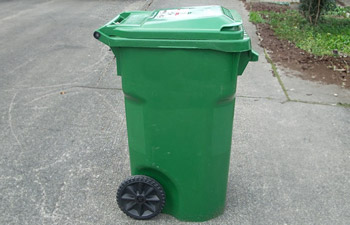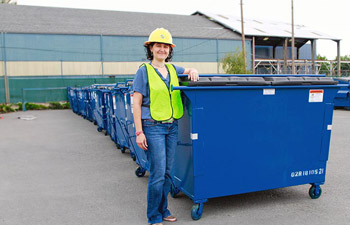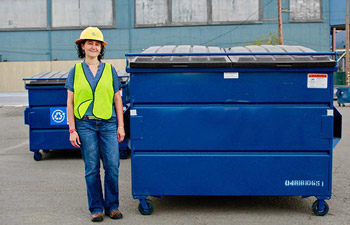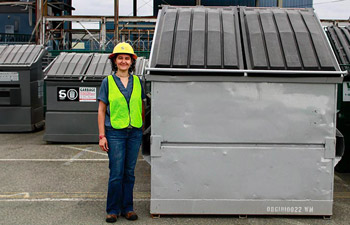Commercial organics diversion
Learn about your business or commercial property’s options for diverting food and yard waste.
King County businesses can save money and reduce waste by diverting food and yard waste from the landfill. Organics collection is often less costly than garbage disposal. Materials can be donated or turned into earth-friendly compost at a local facility.
What are organic materials? What can be composted in my area?
| Materials | Compostable? |
|---|---|
| Food scraps, such as produce, dairy, grains, meat, bones, and eggshells |
✓ |
| Food-soiled paper and boxes that do not have a waxy/shiny coating |
✓ |
| Plants, flowers, yard waste, and untreated wood |
✓ |
| NO pet waste or diapers |
✕ |
| NO fats, oil, or grease |
✕ |
Help create nutrient-rich compost by checking what goes in the organics bin and what stays out. Compost is used on our local landscapes to maintain a healthy environment for plants, animals, and people. See more at Compost Right.
2022 Organics Management Law (OML)
Beginning in 2024, certain businesses throughout the state of Washington will be required to divert organic waste from the garbage by donating edible food, establishing curbside collection, self-hauling to a transfer station that accepts the waste, and/or composting on site.
- January 1, 2024 - Businesses generating at least eight cubic yards of organic waste per week must arrange for organic materials management.
- January 1, 2025 – Businesses generating at least four cubic yards of organic waste per week must arrange for organic materials management.
- January 1, 2026 – Businesses generating at least 96 gallons of organic waste per week must arrange for organic materials management
How do I know if my business is required to comply with the law?
Conducting a “waste audit” is a great way to start. Evaluate how often your outdoor garbage containers fill up and about how much is food/yard waste. Estimates are OK! Determine what size your containers are and how often they are serviced by a hauler. If you are near the law’s threshold for the year, reach out to a waste hauler or explore ways to reduce your organic waste.




Only businesses in geographic areas designated by the Department of Ecology will be required to comply. These areas will be updated every year in July. As of 2024, the majority of western King County is included. To verify if your business address is included, please visit Ecology’s interactive map: 2024 Business Organics Management Areas (BOMA).
Donate edible food
By donating edible food to local food banks or meal programs, you can:
- Prevent food waste in King County.
- Lower costs with a reduced garbage bill and/or qualify for a tax deduction.
- Support those in need in your community.
- Inspire employee pride.
- Save valuable resources that go into the creation of food.
Donors who provide food in good faith are protected by both state and federal Good Samaritan laws. Food rescue organizations have the networks, staff, and infrastructure to distribute food quickly and safely. Donations of almost any type and quantity are needed and welcome!
A list of local hunger relief organizations can be found here
Repurpose and reduce excess food
Find new ways to reduce food waste, such as:
- Explore networks that allow others to purchase unsold food, from single-serve meals to bulk product.
- Offer “day-olds” to customers at a reduced price.
- Evaluate purchasing and back of house stocking practices.
- Engage employees and seek their ideas on how to create a more sustainable workplace.
Visit our Food too Good to Waste site for more tips or check out large scale case studies from the Pacific Coast Collaborative.
Establish curbside collection
Some cities may already hold a contract that covers organic waste collection for your business. Check with your city’s recycling coordinator or solid waste lead. For businesses not covered by a city contract, there are a variety of organic waste haulers in King County you may choose to work with, such as:
- Cedar Grove
- Commercial Waste Reduction and Recycling (CWRR)
- Recology
- Republic Services
- Waste Management
For temporary container service, many other providers are available. Visit the What do I do with…? site and search for food or yard waste. King County maintains these lists as a courtesy to the public and does not endorse or guarantee the quality of the service provided. This list should not be considered exhaustive. Don’t see your company? Contact organics@kingcounty.gov.
Compost on-site
Learn how to compost food and yard waste using an onsite "in-vessel" system, where organic waste is fully contained and resistant to pests. Learn more at Backyard composting.
Bring yard waste to a King County facility
Businesses can self-haul yard waste to several King County recycling and transfer stations.
For more information on locations, accepted materials, and fees, visit the facilities site

 Translate
Translate